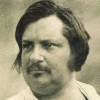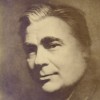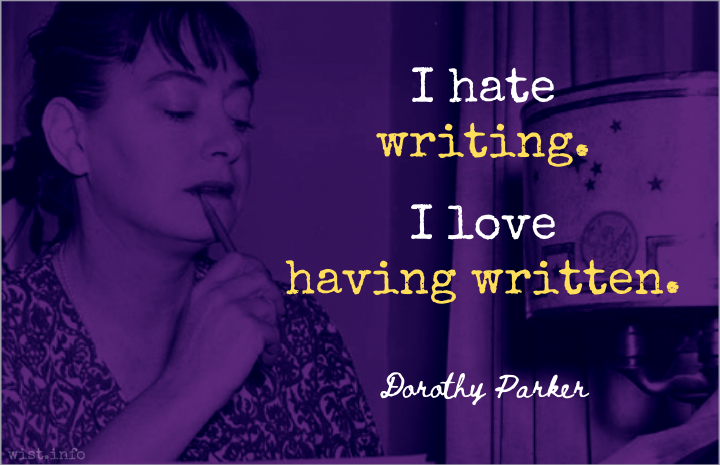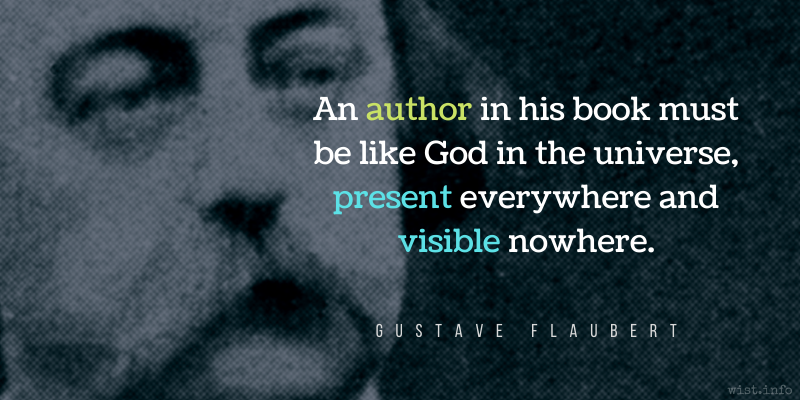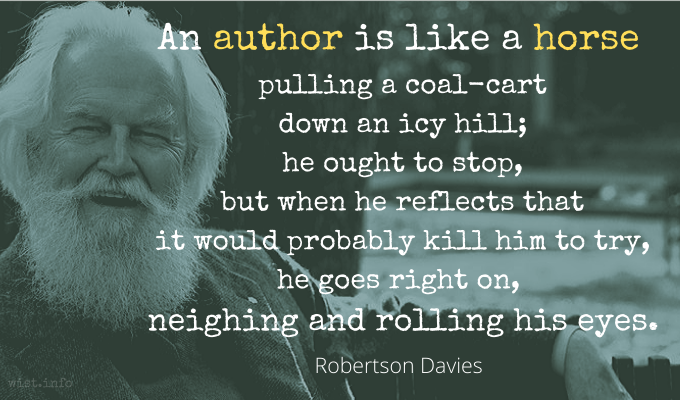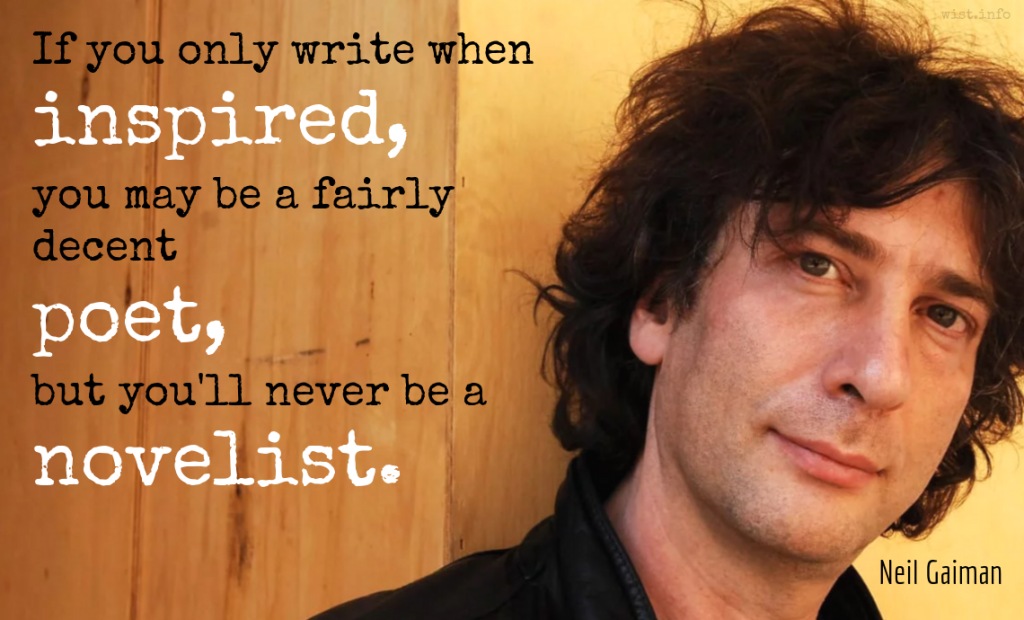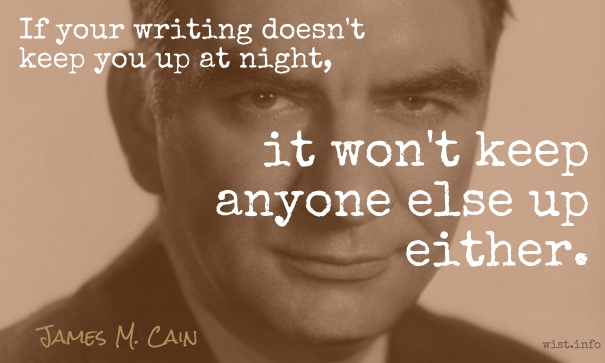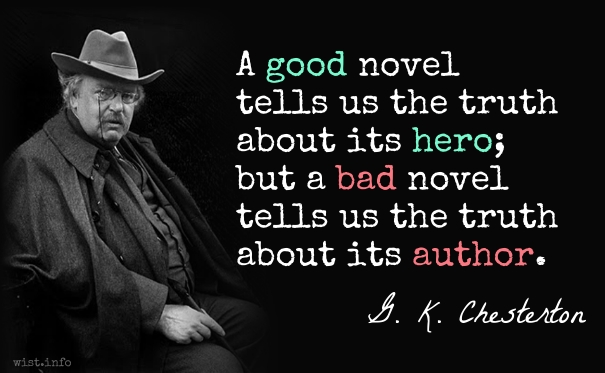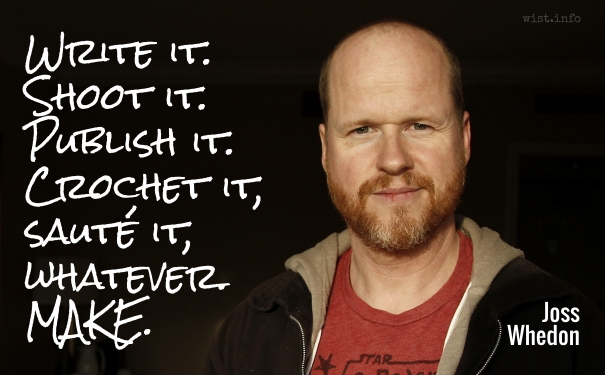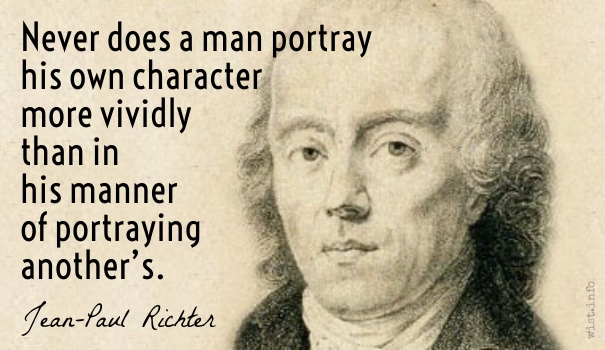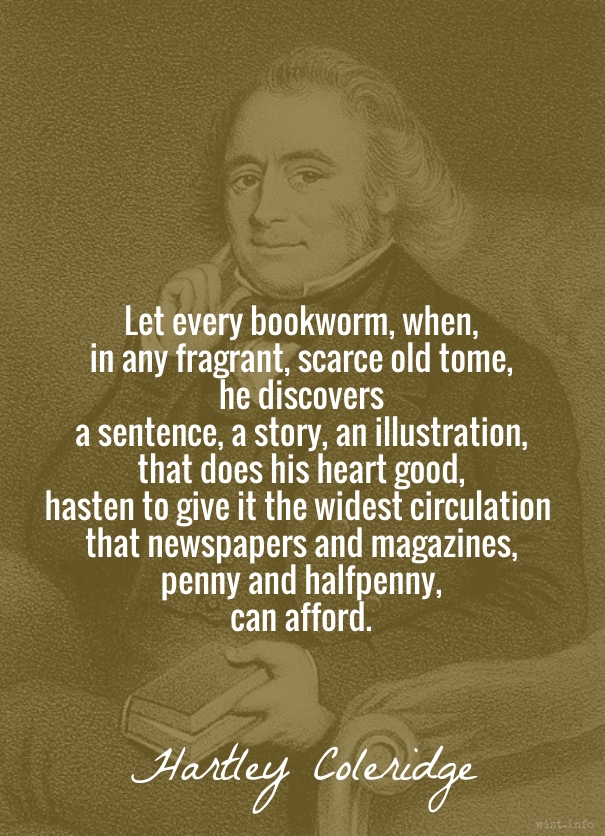To return to the matter of the persona, I repeat that one cannot wholly eliminate oneself for a second, and also sufficient, reason: any fiction (and surely poetry too?) is bound to be transposed autobiography. (True, it may be this at so many removes as to defeat recognition.) I can, and indeed if i would not I still must, relate any and every story I have written to something that happened to me in my own life. But here I am speaking of happenings in a broad sense — to behold and react, is where I am concerned a happening; speculations, unaccountable stirs of interest, longings, attractions, apprehensions without knowable cause — these are happenings, also.
Quotations about:
author
Note not all quotations have been tagged, so Search may find additional quotes on this topic.
Writing is like prostitution. First you do it for the love of it, then you do it for a few friends, and finally you do it for money.
Ferenc Molnár (1878-1952) Hungarian-American author, stage director, dramatist [a.k.a. Franz Molnar]
Quoted in George Jean Nathan, Intimate Notebooks (1932)
(Source)
Common form of a quote often misattributed to Molière. It original version actually appears to have originated with Molnar, who, when asked how he regarded his writing, answered, "Like a whore. First, I did it for my own pleasure. Then I did it for the pleasure of my friends. And now -- I do it for money."
More discussion here.
If you have any young friends who aspire to become writers, the second greatest favor you can do them is to present them with copies of The Elements of Style. The first greatest, of course, is to shoot them now, while they’re happy.
Dorothy Parker (1893-1967) American writer
“Book Reviews,” Esquire (1 Nov 1959)
(Source)
Review of William Strunk Jr and E. B. White, The Elements of Style, revised edition.
If the artist does not throw himself into his work as Curtius sprang into the gulf, as a soldier leads a forlorn hope without a moment’s thought, and if when he is in the crater he does not dig as a miner does when the earth has fallen in on him; if he contemplates the difficulties before him instead of conquering them one by one, like the lovers in fairy tales, who to win their princesses overcome ever-new enchantments, the work remains incomplete; it perishes in the studio where creativeness becomes impossible, and the artist looks on the suicide of his own talent.
[Si l’artiste ne se précipite pas dans son oeuvre, comme Curtius dans le gouffre, comme le soldat dans la redoute, sans réfléchir; et si, sans ce cratère, il ne travaille pas comme le mineur enfoui sous un éboulement: s’il contemple enfin les difficultés au lieu de las vaincre une à une, à l’example de ces amoureux des féeries, qui pour obtenir leurs princesses, combattaient des enchantements renaissants, l’oeuvre reste inachevée, elle périt au fond de l’atelier où la production devient impossible, et l’artiste assiste au suicide de son talent.]
Honoré de Balzac (1799-1850) French novelist, playwright
Cousin Betty [La Cousine Bette] (1846) [tr. Waring (1899)]
(Source)
Curtius is the young Roman patrician, Marcus Curtius. In 362 BC, a chasm opened up in Rome's forum, and soothsayers proclaimed it could only be filled by Rome's greatest treasure. Curtius mounted his horse and leapt into the chasm, which then closed over him.
Alt. trans.:
- "If the artist does not throw himself into his work, like Curtius into the gulf beneath the Forum, like a soldier against a fortress, without hesitation, and if, in that crater, he does not work like a miner under a fall of rock, if, in short, he envisages the difficulties instead of conquering them one-by-one, following the examples of lovers in fairy-tales who, to win their princesses, struggle against recurring enchantments, the work remains unfinished, it expires in the studio, wher production remains impossible and the artist looks on at the suicide of his own talent." [tr. Raphael (1992)]
- "If the artist does not fling himself, without reflecting, into his work, as Curtius flung himself into the yawning gulf, as the soldier flings himself into the enemy's trenches, and if, once in this crater, he does not work like a miner on whom the walls of his gallery have fallen in; if he contemplates difficulties instead of overcoming them one by one ... he is simply looking on at the suicide of his own talent." [Source]
- Original French.
A work of art has an author and yet, when it is perfect, it has something which is essentially anonymous about it.
Simone Weil (1909-1943) French philosopher
Gravity and Grace [La Pesanteur et la Grâce], “Beauty” (1947) [ed. Thibon] [tr. Crawford/von der Ruhr (1952)]
(Source)
PHILINTE: A gentleman may be respected still,
Whether he writes a sonnet well or ill.
That I dislike his verse should not offend him;
In all that touches honor, I commend him;
He’s noble, brave, and virtuous — but I fear
He can’t in truth be called a sonneteer.”On peut être honnête homme, et faire mal des vers,
Ce n’est point à l’honneur que touchent ces matières,
Je le tiens galant homme en toutes les manières,
Homme de qualité, de mérite et de cœur,
Tout ce qu’il vous plaira, mais fort méchant auteur.Molière (1622-1673) French playwright, actor [stage name for Jean-Baptiste Poquelin]
Le Misanthrope, Act 4, sc. 1, ll. 1144-48 (1666) [tr. Wilbur (1954)]
(Source)
Alt. trans.:
- "A man can be a gentleman and make bad verses. Such matters do not touch his honor, and I hold him to be a gallant man in every other way; a man of quality, of courage, deserving of anything you please, but -- a bad writer." [tr. Wormeley (1894)]
- "A man may be / A perfect gentleman, and write poor verse. / These matters do not raise the point of honor. / I hold him a true man in all respects, / Brave, worthy, noble, anything you will, / But still, a wretched writer." [tr. Page (1913)]
- "Anyone may be an honorable man, and yet write verse badly." [Bartlett]
What really knocks me out is a book that, when you’re all done reading it, you wish the author that wrote it was a terrific friend of yours and you could call him up on the phone whenever you felt like it. That doesn’t happen much, though.
business business business
grind grind grind
what a life for a man
that might have been a poetDon Marquis (1878-1937) American journalist and humorist
“pete the parrot and shakespeare,” archy and mehtabel (1927)
(Source)
I always make the first Verse well, but I’m perplex’d about the rest.
[Je fais toujours bien le premier vers: mais j’ai peine à faire les autres.]
Molière (1622-1673) French playwright, actor [stage name for Jean-Baptiste Poquelin]
The Romantick Ladies [Les Précieuses Ridicules], Act 1, sc. 11 (1659)
(Source)
Alt. trans.: "I always make the first verse well, but I have trouble making the others."
I hate writing. I love having written.
Dorothy Parker (1893-1967) American writer
(Spurious)
Not found in any of Parker's works, and not attributed to her until several years after her death. The earliest rendition of a thought like this ("Don't like to write, but like having written") comes from novelist Frank Norris in a posthumous letter published in "The Bellman's Book Plate: The Writing Grind," The Bellman (4 Dec 1915).
More discussion here: Don’t Like to Write, But Like Having Written – Quote Investigator.
See also Pratchett.
Home is in every sentence of your writing.
Maya Angelou (1928-2014) American poet, memoirist, activist [b. Marguerite Ann Johnson]
“The Art of Fiction,” Paris Review, #116, Interview with George Plimpton (1990)
(Source)
I never saw an author in my life — saving perhaps one — that did not purr as audibly as a full-grown domestic cat on having his fur smoothed the right way by a skillful hand.
It isn’t easy for an author to remain a pleasant human being: both success and failure are usually of a crippling kind.
Graham Greene (1904-1991) English novelist [Henry Graham Greene]
“The Poker-Face,” The Spectator (15 Oct 1943)
(Source)
Reprinted in The Lost Childhood and Other Essays (1951).
I have found that a story leaves a deeper impression when it is impossible to tell which side the author is on.
Booksellers are the most valuable destination for the lonely, given the number of books that were written because authors couldn’t find anyone to talk to.
Alain de Botton (b. 1969) Swiss-British author
The Consolations of Philosophy, ch. 4 “Consolation for Inadequacy” (2000)
(Source)
An author in his book must be like God in the universe, present everywhere and visible nowhere.
Gustave Flaubert (1821-1880) French writer, novelist
Letter to Louise Colet (9 Dec 1852)
(Source)
In a later letter to Leoroyer de Chanepie (18 Mar 1857), he repeated the sentiment: "The artist must be in his work as God is in creation, invisible and all-powerful; one must sense him everywhere but never see him."
The art object is always passive in relation to its audience. It is alarmingly active, however, in relation to its creator. Far from being like a receptacle in which you, the artist, drop your ideas, and far from being like a lump of clay which you pummel until it fits your notion of an ashtray, the art object is more like an enthusiastic and ill-trained Labrador retriever which yanks you into traffic.
Annie Dillard (b. 1945) American author
Living by Fiction (1983)
(Source)
Often paraphrased, "Art is like an ill-trained Labrador retriever that drags you out into traffic."
I think the author who speaks about his own books is almost as bad as a mother who talks about her own children.
Benjamin Disraeli (1804-1881) English politician and author
Speech, Banquet to Lord Rector, University of Glasgow (19 Nov 1870)
(Source)
The dramatic art is particularly satisfying for any writer with a polemical bent; and I am at heart a propagandist, a tremendous hater, a tiresome nag, complacently positive that there is no human problem which could not be solved if people would simply do as I advise.
Gore Vidal (1925-2012) American novelist, dramatist, critic
Visit to a Small Planet and Other Television Plays, Preface (1956)
(Source)
I’m not interested in writing short stories. Anything that doesn’t take years of your life and drive you to suicide hardly seems worth doing.
Cormac McCarthy (1933-2023) American novelist, playwright, screenwriter
“Hollywood’s Favorite Cowboy,” interview with John Jurgensen, The Wall Street Journal (20 Nov 2009)
(Source)
The author is like the host at a party. It is his party, but he must not enjoy himself so much that he neglects his guests. His enjoyment is not so much his own as it is theirs.
Charles P. Curtis (1891-1959) American attorney, legal scholar, author [Charles Pelham Curtis, Jr.]
A Commonplace Book (1957)
(Source)
A real writer learns from earlier writers the way a boy learns from an apple orchard — by stealing what he has a taste for and can carry off.
Archibald MacLeish (1892–1982) American poet, writer, statesman
In Charles Poore, “Mr. MacLeish and the Disenchantmentarians,” The New York Times (25 Jan 1968)
(Source)
I look at some of the great novelists, and I think the reason they are great is that they’re telling the truth. The fact is they’re using made-up names, made-up people, made-up places, and made-up times, but they’’re telling the truth about the human being — what we are capable of, what makes us lose, laugh, weep, fall down, and gnash our teeth and wring our hands and kill each other and love each other.
Maya Angelou (1928-2014) American poet, memoirist, activist [b. Marguerite Ann Johnson]
“The Art of Fiction,” Paris Review, #116, Interview with George Plimpton (1990)
(Source)
Yet soft, my books, no haste, nor hurry fate;
If fame must wait on death, then let it wait.[Vos tamen o nostri ne festinate libelli:
Si post fata venit gloria, non propero.]Martial (AD c.39-c.103) Spanish Roman poet, satirist, epigrammatist [Marcus Valerius Martialis]
Epigrams [Epigrammata], Book 5, epigram 10 (5.10.11-12) (AD 90) [tr. Pott & Wright (1921)]
(Source)
Compare to Epigram 1.25.
"To Regulus." (Source (Latin)). Alternate translations:
But haste not you (my Bookes) for Fame, to whom
Tis soone enough if after death it come.
[tr. May (1629)]
Let others to the Printing Presse run fast.
Since after death comes glory, Ile not haste.
[tr. Herrick (1648)]
O my small books, ne'er hasten to go out:
If praise come after death, I'll not go on.
[tr. Fletcher (1656)]
Yet you (my Bookes!) hast not to much, I pray:
If fame come not till after death, I'll stay.
[British Library MS Add. 27343]
With patience then, my Muse, to glory hy:
If after death she come, I shall not dy.
[tr. Elphinston (1782), 3.62]
Do not, however, you little books of mine, be in haste for fame:
if glory comes only after death, I am in no hurry for it.
[tr. Bohn's Classical (1859)]
If I gain fame after my death, I am content to wait.
[tr. Paley/Stone (1890), ep. 221]
Therefore, little books of mine,
Haste not; if glory comes but after death,
I'll wait awhile for glory.
[ed. Harbottle (1897)]
Pray, my impatient Muse, don't worry.
If death's due first, I'm in no hurry.
[tr. Francis & Tatum (1924), ep. 221]
Impatient little books of verse
For the plaudits of the universe,
If fame comes only after death,
Let's pause and rest, and catch our breath.
[tr. Marcellino (1968)]
But there's no cause, my little books, to worry:
If glory must be posthumous, why hurry?
[tr. Michie (1972)]
So, little books, let's not rush to our fate.
Since death comes before glory, let's be late.
[tr. Matthews (1992)]
So be calm, my Muse -- no need to rush or fret:
If death must precede fame, I'll not be famous yet.
[tr. Ericsson (1995)]
If I must die to get my fame,
I gladly will put off the same.
[tr. Wills (2007)]
Then be content, my books, to be slow paced;
Death before glory means -- no need for haste.
[tr. Pitt-Kethley (2008)]
But you, my little books, don’t hurry:
if glory comes only after death, I will not rush.
[tr. Robinson (2022)]
If glory comes after death, I hurry not.
[tr. Rush]
I’m convinced if I keep going one day I will write something decent. On very bad days I will observe that I must have written good things in the past, which means that I’ve lost it. But normally I just assume that I don’t have it. The gulf between the thing I set out to make in my head and the sad, lumpy thing that emerges into reality is huge and distant and I just wish that I could get them closer.
Neil Gaiman (b. 1960) British author, screenwriter, fabulist
“This Much I Know,” The Guardian (5 Aug 2017)
(Source)
There’s nothing like studying the bestseller lists of bygone years for teaching an author humility. You’ve heard of the ones that got filmed, normally. Mostly you realize that today’s bestsellers are tomorrow’s forgotten things.
Neil Gaiman (b. 1960) British author, screenwriter, fabulist
“This Much I Know,” The Guardian (5 Aug 2017)
(Source)
Why fight off fame now beating at your door?
What other writers dare to promise more?
You must make immortality start now,
Not make it wait to give your corpse a bow.[Ante fores stantem dubitas admittere Famam
Teque piget curae praemia ferre tuae?
Post te victurae per te quoque vivere chartae
Incipiant: cineri gloria sera venit.]Martial (AD c.39-c.103) Spanish Roman poet, satirist, epigrammatist [Marcus Valerius Martialis]
Epigrams [Epigrammata], Book 1, epigram 25 (1.25.5-8) (AD 85-86) [tr. Wills (2007)]
(Source)
"To Faustinus." (Source (Latin)). Some early writers number this as ep. 26, as noted. Alternate translations:
Wilt not admit fame standing at thy doore?
And take the fruit of all thy paines before?
Fame to the Urne comes late; let those Books live
With thee, which after life to thee must give.
[tr. May (1629), 1.26]
Dost doubt t'admit Fame standing at thy gate?
Thy labour's just reward to bear, dost hate?
That which will after, in thy time let live:
Too late men praise unto our ashes give.
[tr. Killigrew (1695)]
Fame at your portal waits; the door why barr'd?
Why loth to take your labour's just reward?
Let works live with you, which will long survive;
For honours after death too late arrive.
[tr. Hay (1755), 1.26]
Admit fair fame, who dances at thy door;
And dain to reap thyself thy toil's reward.
The strains that shall survive thee, give to soar;
Nor to thine ashes leave the late record.
[tr. Elphinston (1782), 2.34]
Do you hesitate to let in Fame when standing for admittance before your threshold, and does it grieve you to reap the rewards of your own diligence? May your poems, which will survive you, begin to live by your means. The glory which is shed upon ashes arrives full late.
[tr. Amos (1858), 1.26 "Posthumous Works"]
Do you hesitate to admit Fame, who is standing before your door; and does it displease you to receive the reward of your labour? Let the writings, destined to live after you, begin to live through your means. Glory comes too late, when paid only to our ashes.
[tr. Bohn's Classical (1859)]
If after thee thy verses are to live,
Let them begin whilst thou'rt alive. Too late
The glory that illumines but they tomb.
[ed. Harbottle (1897)]
Do you hesitate to admit Fame that stands before your doors, and shrink from winning the reward of your care? Let writings that will live after you by your adi also begin to live now; to the ashes of the dead glory comes too late.
[tr. Ker (1919)]
Nay, doth it irk you that reward is nigh?
Why bar out fame who standeth at the gate?
Give birth to what must live, before you die,
For honour paid to ashes comes too late.
[tr. Pott & Wright (1921)]
Fame stands before your threshold, let her in;
Are you ashamed your meed of praise to win?
Your books will long outlive you in their fame;
Come then, begin, for ashes have no name.
[tr. Francis & Tatum (1924), #14]
Tell me why you hesitate;
Fame is standing at your door.
Take the prize she long has offered,
Long has held for you in store!
Let works that will survive you after
You have trod the path so dread
Live now, while you still are living.
Fame comes too late to the dead.
[tr. Marcellino (1968)]
Fame is at the door,
and you keep her waiting.
You can't bring yourself to accept
the reward of your worry?
Hurry!
Let those pages begin to live -- show your face.
They will live on after you're gone in any case.
[tr. Bovie (1970)]
Do you hesitate to let Fame in when she stands at your door? Are you reluctant to take the reward for your pains? Your pages will live after you; let them also begin to live through you. Glory comes late to the grave.
[tr. Shackleton Bailey (1993)]
Amos (above) provides a number of examples where the last line has inspired other writers. Byron wrote, in the same vein, in "Martial, Lib. I, Epig. I" (c. 1821):
He unto whom thou art so partial,
O reader! is the well-known Martial,
The Epigrammatist: while living
Give him the fame thou wouldst be giving;
So shall he hear, and feel, and know it --
Post-obits rarely reach a poet.
Strict censure may this harmless sport endure:
My page is wanton, but my life is pure.[Innocuos censura potest permittere lusus:
Lasciva est nobis pagina, vita proba.]Martial (AD c.39-c.103) Spanish Roman poet, satirist, epigrammatist [Marcus Valerius Martialis]
Epigrams [Epigrammata], Book 1, epigram 4 (1.4.7-8) (AD 85-86) [tr. Duff (1929)]
(Source)
An appeal to Emperor Domitian, who became censor-for-life in AD 85.
(Source (Latin)). Alternate translations:
Wantons we are; and though our words be such,
Our Lives do differ from our Lines by much.
[tr. Herrick (1648)]
The Censor does with harmless Pastime bear;
My Leaves are wanton, but my Life’s severe.
[tr. Killigrew (1695)]
The censorship may tolerate innocent jokes:
my page indulges in freedoms, but my life is pure.
[tr. Bohn's Classical (1859)]
Licentious though my page, my life is pure.
[ed. Harbottle (1897)]
A censor can permit harmless trifling:
wanton is my page; my life is good.
[tr. Ker (1919)]
From censure may my harmless mirth be free,
My page is wanton but my life is clean.
[tr. Pott & Wright (1921)]
Your censure well such license may endure;
My page is wanton, but my life is pure.
[tr. Francis & Tatum (1924)]
The censor passes the risqué parts in a play
and my pages can be very gay
without my being that way.
[tr. Bovie (1970)]
Harmless wit
You may, as Censor, reasonably permit:
My life is strict, however lax my page.
[tr. Michie (1972)]
A censor can permit harmless jollity. My page is wanton, but my life is virtuous.
[tr. Shackleton Bailey (1993)]
A censor can relax, wink just one eye:
My poetry is filthy -- but not I.
[tr. Wills (2007)]
As Censor, you can exercise discretion: my jokes hurt no one; let them be. My page may be dirty, but my life is clean.
[tr. Nisbet (2015)]
Let not these harmless sports your censure taste:
My lines are wanton, but my life is chaste.
[tr. 17th C Manuscript]
These games are harmless, censor: let them pass.
My poems play around; but not my life.
[tr. Elliot]
Back in the nineteen-hundreds it was a wonderful experience for a boy to discover H. G. Wells. There you were, in a world of pedants, clergymen and golfers, with your future employers exhorting you to “get on or get out”, your parents systematically warping your sexual life, and your dull-witted schoolmasters sniggering over their Latin tags; and here was this wonderful man who could tell you about the inhabitants of the planets and the bottom of the sea, and who knew that the future was not going to be what respectable people imagined.
George Orwell (1903-1950) English writer [pseud. of Eric Arthur Blair]
“Wells, Hitler, and the World State,” Horizon (Aug 1941)
(Source)
Why do I write? I guess that’s been asked of every writer. I don’t know. It isn’t any massive compulsion. I don’t feel, you know, God dictated that I should write. You know, thunder rends the sky and a bony finger comes down from the clouds and says, “You. You write. You’re the anointed.” I never felt that. I suppose it’s part compulsion, part a channel for what your brain is churning up.
Rod Serling (1924-1975) American screenwriter, playwright, television producer, narrator
“Rod Serling: The Facts of Life,” Interview with Linda Brevelle (4 Mar 1975)
(Source)
The writer … when he’s rejected, that paper is rejected, in a sense, a sizable fragment of the writer is rejected as well. It’s a piece of himself that’s being turned down. And how often can this happen before suddenly you begin to question your own worth and your own value? And even worse, fundamentally, your own talent?
Rod Serling (1924-1975) American screenwriter, playwright, television producer, narrator
“Rod Serling: The Facts of Life,” Interview with Linda Brevelle (4 Mar 1975)
(Source)
I suppose we think euphemistically that all writers write because they have something to say that is truthful and honest and pointed and important. And I suppose I subscribe to that, too. But God knows when I look back over thirty years of professional writing, I’m hard-pressed to come up with anything that’s important. Some things are literate, some things are interesting, some things are classy, but very damn little is important.
Rod Serling (1924-1975) American screenwriter, playwright, television producer, narrator
“Rod Serling: The Facts of Life,” interview by Linda Brevelle (4 Mar 1975)
(Source)
The writer’s role is to menace the public’s conscience. He must have a position, a point of view. He must see the arts as a vehicle of social criticism and he must focus on the issues of his time.
A good novel tells us the truth about its hero; but a bad novel tells us the truth about its author.
Gilbert Keith Chesterton (1874-1936) English journalist and writer
Heretics, ch. 15 “On Smart Novelists and the Smart Set” (1905)
(Source)
The profit of books is according to the sensibility of the reader. The profoundest thought or passion sleeps as in a mine, until an equal mind and heart finds and publishes it.
If you have a good idea, get it out there. For every idea I’ve realized, I have ten I sat on for a decade till someone else did it first. Write it. Shoot it. Publish it. Crochet it, sauté it, whatever. MAKE.
Joss Whedon (b. 1964) American screenwriter, author, producer [Joseph Hill Whedon]
“Dollhouse’s Joss Whedon Answers Your Questions,” Hulu Blog (9 Mar 2009)
(Source)
Why are not more gems from our early prose writers scattered over the country by the periodicals? Selections are so far from preventing the study of the entire authors that they promote it. Who could read the extracts which Lamb has given from Fuller, without wishing to read more of the old Prebendary? But great old books of the great old authors are not in every body’s reach; and though it is better to know them thoroughly than to know them only here and there, yet it is a good work to give a little to those who have neither time nor means to get more. Let every bookworm, when, in any fragrant, scarce old tome, he discovers a sentence, a story, an illustration, that does his heart good, hasten to give it the widest circulation that newspapers and magazines, penny and halfpenny, can afford.
Hartley Coleridge (1796-1849) English poet, biographer, essayist, teacher
Biographia Borealis: or, Lives of Distinguished Northerns, “Roger Ascham” (1833)
(Source)
Speaking of the practice of including brief extracts -- quotations -- from famous authors in magazines and newspapers to fill up columns or create a break between stories. Ironically, this extracted quotation -- slightly paraphrased -- was widely circulated in the mid-late 19th and early 20th Century misattributed to his father, Samuel Taylor Coleridge, or simply labeled as "Coleridge" without citation, leading to the same confusion.
Usually quoted more succinctly as: "Why are not more gems from our great authors scattered over the country? Great books are not in everybody's reach; and though it is better to know them thoroughly, than to know them only here and there; yet it is a good work to give a little to those who have neither time nor means to get more. Let every bookworm, when in any fragrant, scarce old tome he discovers a sentence, a story, an illustration, that does his heart good, hasten to give it."
There are three difficulties in authorship: to write anything worth the publishing, to find honest men to publish it, and to get sensible men to read it.
Charles Caleb "C. C." Colton (1780-1832) English cleric, writer, aphorist
Lacon: or, Many Things in Few Words, Preface (1820)
(Source)
Each writer is born with a repertory company in his head. Shakespeare has perhaps twenty players, and Tennessee Williams has about five, and Samuel Beckett one — and maybe a clone of that one. I have ten or so, and that’s a lot. As you get older, you become more skillful at casting them.
There are three rules for writing a novel. Unfortunately, no one knows what they are.
W. Somerset Maugham (1874-1965) English novelist and playwright [William Somerset Maugham]
(Attributed)
The earliest (uncited) attribution is from 1977. More discussion here.
Next to doing things that deserve to be written, there is nothing that gets a man more credit, or gives him more pleasure, than to write things that deserve to be read.
Lord Chesterfield (1694-1773) English statesman, wit [Philip Dormer Stanhope]
Letter to his son, #44 (1740?)
(Source)
The reason that fiction is more interesting than any other form of literature, to those who really like to study people, is that in fiction the author can really tell the truth without humiliating himself.
Journalism is a good place for any writer to start — the retelling of fact is always a useful trade and can it help you learn to appreciate the declarative sentence. A young writer is easily tempted by the allusive and ethereal and ironic and reflective, but the declarative is at the bottom of most good writing.
Don’t panic. Midway through writing a novel, I have regularly experienced moments of bowel-curdling terror, as I contemplate the drivel on the screen before me and see beyond it, in quick succession, the derisive reviews, the friends’ embarrassment, the failing career, the dwindling income, the repossessed house, the divorce … Working doggedly on through crises like these, however, has always got me there in the end. Leaving the desk for a while can help. Talking the problem through can help me recall what I was trying to achieve before I got stuck. Going for a long walk almost always gets me thinking about my manuscript in a slightly new way. And if all else fails, there’s prayer. St Francis de Sales, the patron saint of writers, has often helped me out in a crisis. If you want to spread your net more widely, you could try appealing to Calliope, the muse of epic poetry, too.
Sarah Waters (b. 1966) Welsh novelist
In “Ten Rules for Writing Fiction,” The Guardian (20 Feb 2010)
(Source)
You know that sickening feeling of inadequacy and over-exposure you feel when you look upon your own empurpled prose? Relax into the awareness that this ghastly sensation will never, ever leave you, no matter how successful and publicly lauded you become. It is intrinsic to the real business of writing and should be cherished.
Will Self (b. 1961) English author, journalist, television personality
In “Ten Rules for Writing Fiction,” The Guardian (20 Feb 2010)
(Source)





